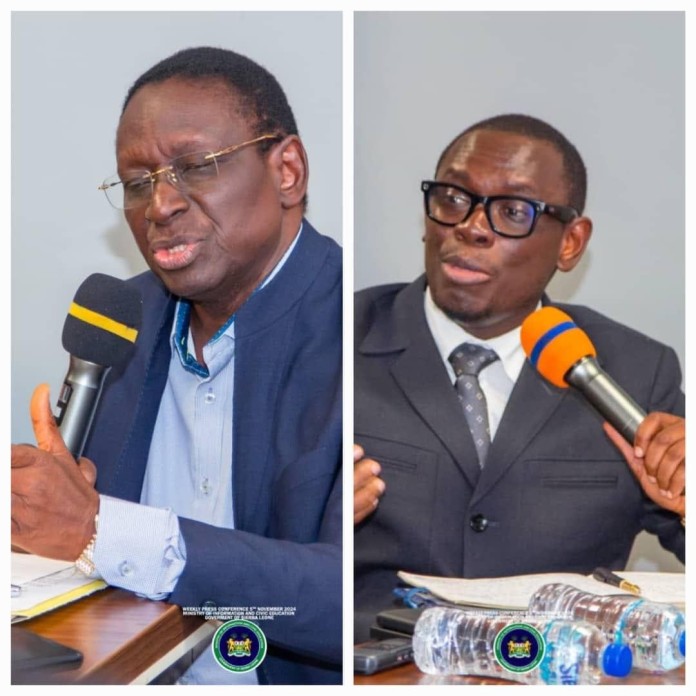By Foday Moriba Conteh
A key update on public service reform efforts was presented during the weekly Ministry of Information and Civic Education press briefing held on November 5, 2024, at the Ministry of Energy conference hall on Siaka Stevens Street. The briefing featured remarks from Kalilu O. Bah, Chairman of the Public Service Commission (PSC) and Sulaiman Phoray-Musa, Director of the Public Service Reform Unit (PSRU), outlining crucial strides towards modernizing Sierra Leone’s public sector.
Chairman Kalilu O. Bah underscored the importance of a strong and efficient public sector as a central pillar of Sierra Leone’s national development. He pointed out that wage disparities have long hindered the effectiveness of public service delivery. To address this, a newly established Wages and Compensation Commission (WCC) will oversee the standardization of salaries across the public sector, ensuring fairness and equity for public servants.
In a landmark development, Chairman Kalilu O. Bah announced the drafting of Sierra Leone’s first-ever Public Service Act. He explained that while the PSC has played a pivotal role in human resource management and recruitment for positions from grade 7 and above, the absence of a formal legislative framework had limited its effectiveness. The new Public Service Act will modernize the PSC’s mandate, enabling more streamlined and efficient operations.
The chairman also distinguished between the Civil Service and the broader Public Service. He clarified that while the Civil Service is made up of specialized professionals directly responsible for implementing Government programs and policies, the Public Service encompasses not only the Civil Service but also various parastatals and other public entities. The PSC regulates the human resources across these bodies, overseeing recruitment, supervision and termination when necessary.
Director Phoray-Musa provided an overview of ongoing reform efforts in areas like the Teaching Service Commission (TSC), the Pay Performance Project (PPP), the Wages and Compensation Commission (WCC) and the Financial Management Act (FMA). While these initiatives had made progress, he noted that their fragmented nature had hindered their broader impact on public sector transformation.
To address these challenges, President Julius Maada Bio in 2023 established the Ministry of Public Administration and Political Affairs. This new ministry is tasked with coordinating public sector reform efforts to ensure they are aligned and efficient. A key outcome of these efforts is the comprehensive Master Plan for public service reform, developed collaboratively by the PSRU and PSC. The plan aims to create a unified vision for reform and has undergone validation by key stakeholders to ensure its credibility and feasibility.
A significant element of the reform agenda is the transformation of the Civil Service College into a Public Service Academy, which will focus on enhancing the professional development and training of public servants. Phoray-Musa emphasized that this initiative is a vital part of the broader goal to standardize recruitment and employment processes within the public sector, underpinned by clear policies and procedures.
“The Master Plan for service delivery represents a unified approach to overhauling the public service architecture,” Phoray-Musa concluded.
The combined efforts of the PSRU and PSC are set to overhaul Sierra Leone’s public service system, bringing about legislative reforms, strategic coordination, and institutional strengthening. These changes are expected to enhance efficiency, equity and alignment with the country’s national development objectives, paving the way for a more robust and responsive public service.






